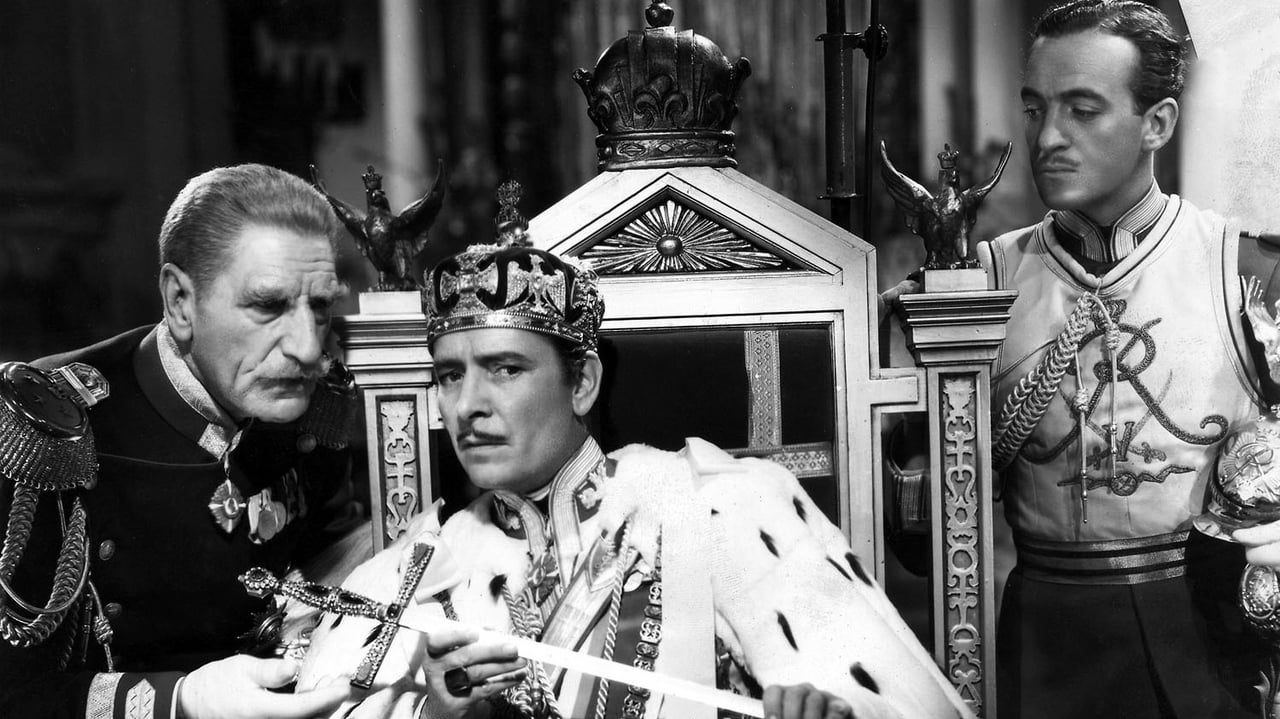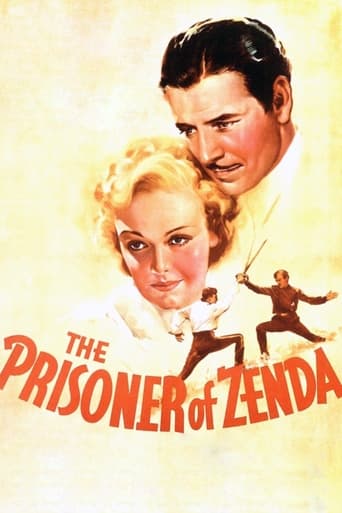

No coincidence that this film about a negligent, pleasure-loving monarch should have appeared in 1937. It was actually meant to point a discreet finger at the fugitive King Edward VIII, with war fast approaching, and notions of duty and leadership suddenly front-of-mind.This was not the first or last dramatisation of the Anthony Hope novel that put Ruritania on the map - feeding a strong psychological need to believe in a recent, yet quite mythical age 'when history still wore a rose'.The mythology is easy to sneer-at now, with an imaginary Balkan state rescued from anarchy by clean-limbed young English-speakers professing the public-school virtues of decency and fair play. But this film was unusually blessed - in the eyes of the viewing public, if not of the production team. And whatever the backstage disagreements, it must go down as a triumph of casting and direction.At its heart was the well-kept and photogenic Ronald Colman, still just young enough to play the suitor, and somehow able to conceal the limp that came with his war-wound, while at least looking as though he was fencing as nimbly and wholeheartedly as the best of them.Colman arrives in Ruritania as an English sporting gent (Rassendyll), hoping for a few days' fishing. But he soon learns that he is the split-image of his distant cousin, the new King, due to be crowned next day. By chance, he is introduced to the King, who is greatly amused at meeting his own double, and entertains him to a lavish dinner, where the King is the only one left awake to drink the drugged wine, sent by his jealous half-brother Michael (Raymond Massey).It is betraying no more than the obvious, if we reveal that the King is not capable of attending his own coronation, and Rassendyll is put under pressure to dress-up and be crowned in his place, while the King is recovering.But if only it were that simple...Along the way, we get Douglas Fairbanks Jr. in his greatest film role as Michael's swashbuckling sidekick Rupert, competing for Mary Astor in her most glamorous appearance as Michael's lover; and Madeleine Carroll, a vision of loveliness and virtue as the future Queen. All presided-over by Aubrey Smith, the ex-England cricketer whose weekend matches so intrigued Hollywood, and brought attention to the young David Niven, who plays his deputy, Fritz.The near-perfect direction is spoiled by three things. Towards the climax, we can't quite keep up with the intricacies of the sub-plot, or grasp which location we're at (mostly outdoors at night). When it comes to the duelling scenes, the dialogue is even more bogus than you expect, with too many comic-strip challenges to chivalric honour. And the final scene between Rudolf and Flavia is disappointingly mechanical and rushed, as their earlier scenes are not.Overall, though, this film manages to distil its various elements into something bigger than just Danubian waltzes and duels - a rare cinematic moment, never to be eclipsed.
... View MoreAh the Hollywood studio system...Ah the Costume Epic...Ah the Swashbuckler.There are many films that fans of romantic escapism can enjoy and this is one of them. This type of thing set the Women's hearts on fire and this is what passed as rousing adventure for the pre-media generation of young and virile men.It was a time when movies were making the popular culture transition from ink to celluloid as the preferred mass communication. Literature and the projected light would co exist as the masterful dual dynamos of popular entertainment until post War civilization was awakened to a new form of radiated consciousness.To call this kind of stuff dated is accurate if meant in a respectful manner, because it is, but it is also wonderful, and artful and a beautiful time piece of a more innocent time. This has all the ingredients of that period and place when expectations were of virtuous, larger than life, handsome, and beautiful people beyond the realm. These actors would never mumble and these characters would never fail to inspire and Good won out over Evil.This is a spot on delivery of such glorious fantasy. A reminder that we were not always as cynical as popular culture devotees, but for better or worse, we were more naive.
... View MoreAlthough Ronald Colman radiates charisma in the dual role of monarch and impostor in director John Cromwell's "The Prisoner of Zenda," epic saga of intrigue, romance and swordplay, Douglas Fairbanks, Jr., steals the show as the audacious amoral Count Rupert of Hentzau in an exuberant performance rivaling anything that his matinée idol father ever did. Not only does Rupert defy our hero and his cohorts, but he also thumbs his nose at the chief villain and his accomplices. Beautiful Madeleine Carroll of "The 39-Steps" co-stars as the love interest Princess Flavia, while Raymond Massey scowls arrogantly behind his monocle as the chief villain. Mary Astor, David Niven, and C. Aubrey Smith flesh out a dazzling cast. This lively, 101-minute, black and white, United Artists swashbuckler was the fourth cinematic adaptation of Anthony Hope's popular Victorian novel about dual identities and high court skullduggery when the king's scheming illegitimate half-brother tries to usurp him and claim the crown for himself. Countless scenarists, among them John L. Balderston of "Dracula" fame as well as Ben Hecht of "Scarface: Shame of the Nation" and Sidney Howard, penned the elaborate screenplay. The first two-thirds of "The Prisoner of Zenda" establishes the setting, situation, and characters, while the last third of this lavish costumer delivers thrills and chills, especially a swordfight between Colman and Fairbanks.An Englishman, Major Rudolf Rassendyll (Ronald Colman of "Goodbye, Mr. Chips"), embarks on a holiday to indulge in his penchant for fishing. When he arrives in the small kingdom of Ruritania, Rudolf finds everybody eyeballing him and bothering him about the upcoming coronation. Rudolf has no idea why they are scrutinizing him and he states that he has no intention of attending any coronation. Later, while he is fishing on a game preserve, two of King Rudolph's men accost him and comment about his amazing resemblance to Lord Rudolph V. Indeed, Rudolf turns out to be the sovereign's distant cousin. Rudolph (Ronald Colman in a dual role) invites Rudolf to join him for wine at his royal hunting lodge. Rudolf observes that the king quaffs liquor to excess. After everybody has passed out from too much drink, the future king has one last drink that knocks him out for the long run. Colonel Zapt (crusty C. Aubrey Smith of "Little Lord Fauntleroy") has Captain Fritz von Tarlenheim (David Niven of "The Charge of the Light Brigade ") stash the unconscious Rudolf in the wine cellar until the king recovers. Later, Zapt persuades an initially reluctant Rudolf to masquerade for a day as the man scheduled to be crowned. "If he's not crowned today," Zapt grimly assures Rudolf, "he'll never be crowned." Imagine the surprise and consternation of His Highness Duke Michael (Raymond Massey of "Desperate Journey") when the coronation proceeds as planned. Michael refuses to be thwarted so easily. Rudolph's civility and sobriety surprises Flavia, while Rudolf is quite captivated by her beauty. Princess Flavia's memories of Rudolph's dreadful behavior toward her years before vanish. Of course, Flavia hasn't the slightest clue about the charade perpetrated by Rudolf. Everything seems to be going well for our heroes some 42 minutes into the plot as they return to the hunting lodge to let the real Rudolph resume his rightful place as monarch. Our heroes learn Rupert has kidnapped Rudolph and Michael is equally as surprised. Of course, the villains cannot blow the trumpet on the heroes without incriminating themselves, too.Incredibly, Michael doesn't learn about Rudolf's impersonation until Rupert informs him about it some 58 minutes into the action. At this point, rapacious Rupert negotiates terms from Michael for Rudolph. Meanwhile, Rupert lures Rudolf to a rendezvous after midnight at a deserted summer house behind the wall on the Boulevard Elphberg with Antoinette de Mauban (Mary Astor of "The Kennel Murder Case") to learn the whereabouts of the King. Antoinette warns Rudolf that Rupert is bringing two other men to kill him. She strikes a bargain with Rudolf to free Rudolph as long as no harm befalls Michael. Of course, Michael knows nothing of Antoinette's treachery. She informs Rudolf that Michael has moved Rudolph from a woodcutter's cabin to Michael's castle near Zenda. Further, she tells him that they are prepared to kill Rudolph if Rudolf tries to storm the castle. She agrees to help Rudolf rescue Rudolph and hands him an earring as a sign. Once she formulates a plan for Rudolph's rescue, she will send a servant with the matching earring. Rupert and his men arrive and try to kill Rudolf, but our protagonist escapes. By now Flavia knows about Rudolf's sham. Later, Rupert meets Rudolf at the King's hunting lodge and tries to kill him. Antoinette's servant arrives and explains that he will lower the drawbridge after midnight. One man must swim the moat, scale the castle to Antoinette's room, and reach the dungeon before the guards can murder the king.Again, the best thing about "The Prisoner of Zenda" is Fairbanks' mischievous performance and his treachery toward his own people. The surprise here is that he manages to escape after he kills Michael. Reportedly, producer David 0. Selznick brought in MGM helmer W.S. Van Dyke to restage the climactic action sequences at Michael's castle where Rudolf has to sneak inside despite heavy odds and free the monarch. The swordfight between Rupert and Rudolf and the cavalry charge across the drawbridge is pretty exhilarating stuff that has lost little of its verve. Horsemen gallop across the drawbridge and some crash their horses, virtually plunging them into the camera. This film received two Academy Award nominations: Lyle R. Wheeler for Best Art Direction and Alfred Newman for Best Music Score. "The Prisoner of Zenda" ranks as an above-average escapade with witty dialogue and good performances, especially gorgeous Madeline Carroll who grows quite fond of the impostor.
... View MoreAnthony Hopes's classic tale turned into a classic adventure film with Ronald Coleman as the King and his commoner cousin who must masquerade as the king when he's first drugged into unconsciousness so he can't be crowned and later when the king is kidnapped. Its a rousing tale with a dynamite romance. It's been filmed numerous times and this one is probably the best. I put the Stewart Granger one a half step behind this one because James Mason isn't as evil as Douglas Fairbanks Jr as Rupert of Hentzau. You don't get casts better than this since it has Coleman, Madeline Carol, Fairbanks, David Niven, Raymond Massey, Mary Astor and C Aubrey Smith. You also don't get scripts better than this, the Granger version essentially used the same script so that as it ran I was quoting dialog and making my dad go "I thought you never saw this before". Possibly one of the best adventure films Hollywood ever made, I can't recommend it enough...
... View More